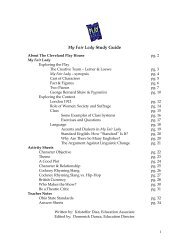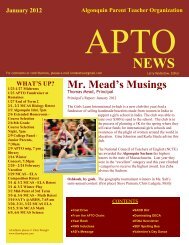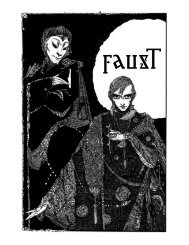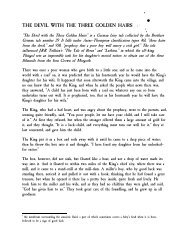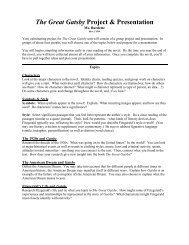Cherry Orchard
Cherry Orchard
Cherry Orchard
Create successful ePaper yourself
Turn your PDF publications into a flip-book with our unique Google optimized e-Paper software.
keep all of those long Russian names straight.” I had planned to make a very faithful<br />
translation of the original play, but this observation troubled me. Wouldn’t it be just another<br />
act of “translation” for an American audience, to provide them clear access to Chekhov’s<br />
idiom by making the names uniform? In the end, I settled upon very specific forms of<br />
address for the characters which I maintained throughout the play, in spite of how many<br />
variants might have appeared in the original text. This is my way of remaining faithful to<br />
Chekhov, and to my audience as well.<br />
What is lost in this act of translation are some of the subtleties of Russian names, which<br />
would be lost on an American audience in any case. I have attempted to preserve the sense of<br />
the hierarchy of names in certain places, but again, I have used an American equivalent.<br />
Wherever a slightly more formal address is required, I have rendered it using “Miss” or<br />
“Mr.” in conjunction with the first name. So, in <strong>Cherry</strong> <strong>Orchard</strong>, the main characters are<br />
“Miss Lovey” or “Mr. Leon,” as opposed to Lyubov Andreevna and Leonid Andreevich,<br />
their true Russian names. These points are minor, yet it has always been my intention to<br />
clarify the meaning of this great writer for an American audience, to give him a full and<br />
appropriate hearing, and never to change or muddy his work. Because audiences simply need<br />
to hear what Chekhov has to say about happiness, struggle and human connection, now more<br />
than ever.<br />
Georgy Tovstonogov, the great, late 20th century Russian director said “Chekhov was ahead<br />
of his time, and productions of his plays must not look to the past, and perhaps not even to<br />
the theater of the present; Chekhov is a man of the future, and it is there that he must be<br />
sought.” He was not suggesting that productions of these rural Russian plays be set in some<br />
far-flung space colony or reinterpreted as underwater ballet. He was simply pointing out that<br />
even though the characters may be dressed in structured bodices and long, full skirts, or in<br />
heavy suits and stiff shirts with vests, the significance of their desires and needs must be<br />
rediscovered as contemporary with each passing moment in each new production. In this<br />
way, interpreters can discover what is truly universal, what is truly transcendent about<br />
Chekhov.<br />
Of course, that’s just one fool’s opinion.<br />
Curt Columbus is Artistic Director of Trinity Repertory Company. His translations of<br />
adaptations include Dostoevsky’s Crime and Punishment. He recently received the Joseph<br />
Jefferson Citation for New Adaptation for Three Sisters. His translation, Chekhov, The Four<br />
Major Plays, is published by Ivan R. Dee.<br />
16







